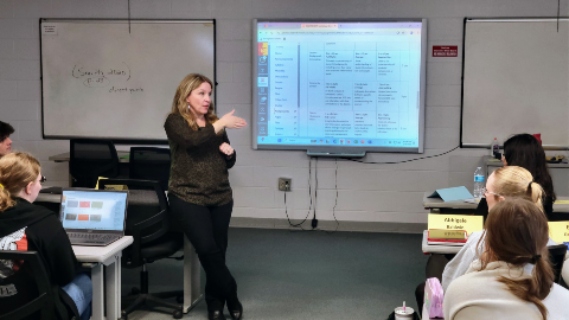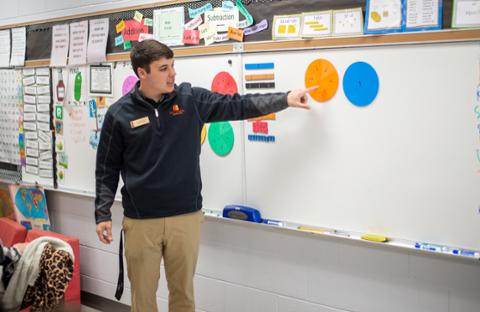Online Master's Degree in
Teaching (Elementary Education K-6)

Start your journey to becoming a licensed school teacher.
The Master of Arts in Teaching (Elementary Education K-6) alternative licensure program is tailored for individuals with a non-teaching bachelor's degree aiming to obtain a teaching license.
Our program equips students with advanced knowledge, practical skills, and invaluable experiences to excel as effective educators, empowering them to make a meaningful impact in diverse learning environments.

Learn from seasoned educators and professionals who bring a wealth of real-world experience to the online classroom. Benefit from their guidance as you further explore your education.

Put theory into practice with hands-on experiences in classroom settings. Collaborate with local schools and educators to step into real classrooms, engage with students, and refine teaching skills.

Stand out in the competitive job market with a specialized Master's degree. Pursue a variety of rewarding careers in education such as classroom teacher or community educator.
Master of Arts in Teaching (Elementary Education K-6) Admission Requirements:
Admissions criteria for the Master’s Degree in Teaching (Elementary Education K-6) will include the following:- A baccalaureate degree from an accredited institution with an official transcript received by PSU
- Cumulative GPA of 3.00
- Successful completion of the professional disposition assessment
- Completion of a background check
- Writing sample
- Two completed recommendations
Unique Class Topics in the Master of Arts in Teaching (Elementary Education K-6) Degree Program
- Advanced Educational Psychology: Explore cutting-edge theories and research in educational psychology, enabling you to analyze and apply psychological principles to enhance teaching effectiveness and promote optimal student learning outcomes.
- Literacy Development and Instruction (3+): Examine advanced literacy development theories and evidence-based instructional strategies for students in grades three and above, equipping educators to foster proficient reading and writing skills across content areas.
- Individuals with Exceptionalities: Investigate the characteristics, needs, and educational interventions for individuals with exceptionalities, empowering you to design and implement inclusive practices that support the diverse learning needs of all students.
- Curriculum Development: Guides you in the design, implementation, and evaluation of standards-based curriculum frameworks and instructional materials, emphasizing alignment with educational standards and best practices.
- Positive Classroom Management: Equips you with proactive and responsive strategies for creating a positive and supportive classroom climate, managing student behavior effectively, and promoting a culture of respect and engagement.
- Assessment for Effective Teaching: Explore principles and practices of assessment for learning, guiding educators in the design, implementation, and interpretation of formative and summative assessments to inform instruction and promote student growth.
- Practica: Gain hands-on experiences in authentic educational settings, allowing students to apply theoretical knowledge, practice teaching skills, and receive feedback under the guidance of experienced mentors.
- The Professional Semester Teacher-Culminating Experience: Culminates the teacher preparation program with a comprehensive capstone experience, enabling students to demonstrate proficiency in teaching practices, reflect on their professional growth, and showcase their readiness for licensure.
- Concentration: Allows students to delve deeply into a specialized area of study through a focused concentration, completing coursework and experiences tailored to their professional interests and career goals.
- Workshop in Health, Human Performance and Recreation: Offers experiential learning opportunities through workshops in health, human performance, and recreation, providing students with practical skills and knowledge in these areas.
- Literacy for the Primary Grades: Explores effective literacy instruction for primary-grade students, emphasizing research-based strategies for developing foundational reading and writing skills.
- Elementary Mathematics and Science: Focuses on innovative instructional approaches and pedagogical strategies for teaching mathematics and science concepts to elementary students, fostering inquiry-based learning and critical thinking skills.
- Integrating Creative Experiences: Examines the integration of creative arts and experiences into the curriculum, providing educators with strategies for enhancing student engagement, expression, and understanding across content areas.
- Literacy and Social Studies for the Intermediate Grades: Addresses literacy instruction and social studies content for intermediate-grade students, emphasizing interdisciplinary connections and meaningful learning experiences.
Jobs of Education Master's Graduates
- Classroom Teacher: Work as a licensed teacher in elementary, middle, or high school settings, delivering instruction, assessing student progress, and fostering academic and social-emotional development.
- Community Educator: Collaborate with community organizations, museums, libraries, or afterschool programs to develop and implement educational initiatives, providing learning opportunities for children, youth, and adults outside of traditional school settings.
- Program Coordinator: Coordinate educational programs or initiatives within schools or districts, overseeing program development, implementation, and evaluation to ensure the delivery of high-quality services to students and educators.